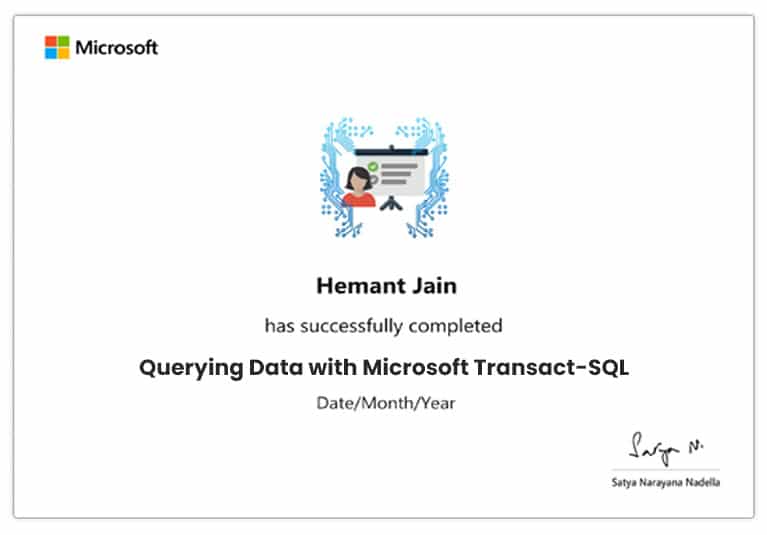Your cart is currently empty.
Become an SQL certified professional with our SQL course in just 1.5 months

Watch
Course PreviewThis SQL Course enables you to manage database solutions and various operations on databases, migrate them to the cloud, and scale them on demand. Accredited by Microsoft, this SQL full course is taught by the best Microsoft-certified SQL industry experts.
This is one of the most important programming languages for working on large databases. This creates a huge demand for SQL developers who can parse all that Big Data and convert it into business insights.
No, there are no mandatory prerequisites for participating in this course. While the training covers all the essential aspects of SQL, having prior experience in this field can certainly be an advantage during the course
Yes, you need to learn programming to become an SQL developer. You can still learn how to become an SQL developer even without prior experience through our SQL Course.
The course covers SQL basics such as SELECT statements, advanced queries including JOINs and subqueries, data manipulation (INSERT, UPDATE, DELETE), database design principles, indexing, stored procedures, and optimization techniques.
Yes, the course includes numerous hands-on exercises and projects where you will work with real-world datasets to apply SQL skills. This practical approach ensures you can handle real data scenarios confidently.
Upon completion, you will receive a Microsoft-recognized SQL certification that confirms your proficiency in SQL, enhancing your resume and proving your expertise to potential employers.
Talk To Us
We are happy to help you 24/7
SQL Architecture
Triggers
Joins
Database Normalization
SQL Views
Functions
Stored Procedures
User-defined Functions
Transact-SQL
Indexes
EMI Starts at
₹5,000
We partnered with financing companies to provide very competitive finance options at 0% interest rate
Financing Partners
![]()
Contact Us
1.1 Various types of databases
1.2 Introduction to Structured Query Language
1.3 Distinction between client-server and file-server databases
1.4 Understanding SQL Server Management Studio
1.5 SQL table basics
1.6 Data types and functions
1.7 Transaction-SQL
1.8 Authentication for Windows
1.9 Data control language
1.10 The identification of the keywords in T-SQL, such as Drop Table
2.1 Entity-Relationship Model
2.2 Entity and Entity Set
2.3 Attributes and types of Attributes
2.4 Entity Sets
2.5 Relationship Sets
2.6 Degree of Relationship
2.7 Mapping Cardinalities, One-to-One, One-to-Many, Many-to-one, Many-to-many
2.8 Symbols Used in E-R Notation
3.1 Introduction to relational databases
3.2 Fundamental concepts of relational rows, tables, and columns
3.3 Several operators (such as logical and relational), constraints, domains, indexes, stored procedures, primary and foreign keys
3.4 Understanding group functions
3.5 The unique key
4.1 Advanced concepts of SQL tables
4.2 SQL functions
4.3 Operators & queries
4.4 Table creation
4.5 Data retrieval from tables
4.6 Combining rows from tables using the inner, outer, cross, and self joins
4.7 Deploying operators such as ‘intersect,’ ‘except,’ ‘union,’
4.8 Temporary table creation
4.9 Set operator rules
4.10 Table variables
5.1 Understanding SQL functions – what do they do?
5.2 Scalar functions
5.3 Aggregate functions
5.4 Functions that can be used on different datasets, such as numbers, characters, strings, and dates
5.5 Inline SQL functions
5.6 General functions
5.7 Duplicate functions
6.1 Understanding SQL subqueries, their rules
6.2 Statements and operators with which subqueries can be used
6.3 Using the set clause to modify subqueries
6.4 Understanding different types of subqueries, such as where, select, insert, update, delete, etc.
6.5 Methods to create and view subqueries
7.1 Learning SQL views
7.2 Methods of creating, using, altering, renaming, dropping, and modifying views
7.3 Understanding stored procedures and their key benefits
7.4 Working with stored procedures
7.5 Studying user-defined functions
7.6 Error handling
8.1 User-defined functions
8.2 Types of UDFs, such as scalar
8.3 Inline table value
8.4 Multi-statement table
8.5 Stored procedures and when to deploy them
8.6 What is rank function?
8.7 Triggers, and when to execute triggers?
9.1 Records grouping, advantages, searching, sorting, modifying data
9.2 Clustered indexes creation
9.3 Use of indexes to cover queries
9.4 Common table expressions
9.5 Index guidelines
10.1 Correlated Subquery, Grouping Sets, Rollup, Cube, Rank, CTE, Indexes, and Triggers
Correlated Subquery, Rollup, Grouping Set and Cubes
Hands-on Exercise
11.1 Applying transactions
11.2 Using the transaction behavior to identify DML statements
11.3 Learning about implicit and explicit transactions
11.4 Isolation levels management
11.5 Understanding concurrency and locking behavior
11.6 Using memory-optimized tables
12.1 Creating Transact-SQL queries
12.2 Querying multiple tables using joins
12.3 Implementing functions and aggregating data
12.4 Modifying data
12.5 Determining the results of DDL statements on supplied tables and data
12.6 Constructing DML statements using the output statement
12.7 Querying data using subqueries and APPLY
12.8 Querying data using table expressions
12.9 Grouping and pivoting data using queries
12.10 Querying temporal data and non-relational data
12.11 Constructing recursive table expressions to meet business requirements
12.12 Using windowing functions to group
12.13 Rank the results of a query
12.14 Creating database programmability objects by using T-SQL
12.15 Implementing error handling and transactions
12.16 Implementing transaction control in conjunction with error handling in stored procedures
12.17 Implementing data types and NULL
12.18 Designing and implementing relational database schema
12.19 Designing and implementing indexes
12.20 Learning to compare between indexed and included columns
12.21 Implementing clustered index
12.22 Designing and deploying views
12.23 Column store views
12.24 Explaining foreign key constraints
12.25 Using T-SQL statements
12.26 Usage of Data Manipulation Language (DML)
12.27 Designing the components of stored procedures
12.28 Implementing input and output parameters
12.29 Applying error handling
12.30 Executing control logic in stored procedures
12.31 Designing trigger logic, DDL triggers, etc.
12.32 Accuracy of statistics
12.33 Formulating statistics maintenance tasks
12.34 Dynamic management objects management
12.35 Identifying missing indexes
12.36 Examining and troubleshooting query plans
12.37 Consolidating the overlapping indexes
12.38 The performance management of database instances
12.39 SQL server performance monitoring
13.1 Performance Tuning and Optimizing SQL Databases
13.2 Querying Data with Transact-SQL
SQL Projects
SQL Certificates are a way to demonstrate one’s fundamental understanding of SQL in the commonly used relational database management systems.
You can pass the SQL exam if you have a sound understanding of SQL Architecture, Triggers, Joins, Database, Normalization, SQL Views, Functions, Stored Procedures, User-defined Functions, Transact-SQL, SQL Server, Indexes, etc.
The SQL Course duration is structured as 30 hours of instructor-led training.
Following are some of the online SQL Certifications available:
Land Your Dream Job Like Our Alumni

This course content is in line with the requirements for clearing the SQL Server Certification exam.
Intellipaat offers lifetime access to videos, materials, 24/7 support, and material upgrading to the latest version at no extra fee. Hence, it is clearly a one-time investment to sign up for this online Microsoft SQL Certification.
Apart from this course, Intellipaat offers online training on SQL Server DBA, Oracle DBA, Oracle RAC, and SQL Developer DBA Masters Program in the Database domain.
Intellipaat has plenty of free learning materials to help you understand the basics of this SQL full course, such as: What is SQL, SQL Tutorial, and SQL Interview Questions.
3 technical 1:1 sessions per month will be allowed.
Yes, you will get a certificate of completion whenever you finish the course successfully. You can download this digital certificate from your account on our learning platform after it is issued. It acts as a formal confirmation of your accomplishment.
Sure, if you need to, you can retake the course. For retakes that occur within a specific time frame following the original course completion, we provide a reduced cost. For additional information on how to sign up for a retake, please get in touch with our support staff.
It’s okay if you skip a class. Every session is recorded and made accessible for you to watch whenever it suits you. You can watch these recordings via your learning platform account to make up for any missed material.
 Click to Zoom
Click to Zoom